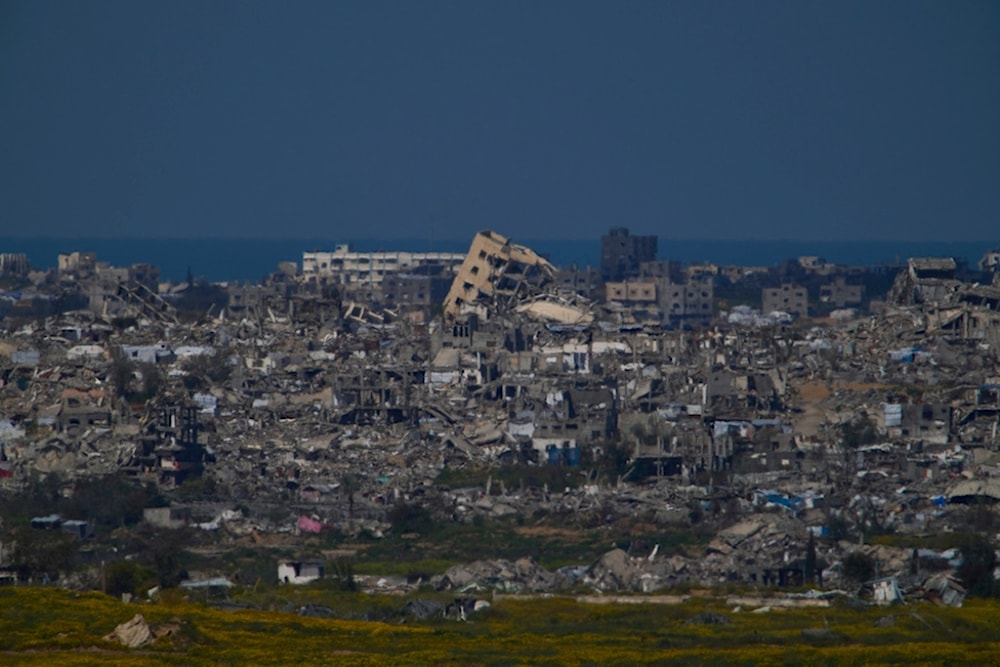'Israel' to propose Gaza military rule in upcoming US talks: Report
"Israel" is advancing a plan to impose full military control over Gaza— including IOF-managed aid distribution—during high-level meetings in Washington, with strong backing from the Trump administration.
-

Buildings that were destroyed during the Israeli ground and air operations stand in the northern of Gaza Strip as seen from southern Palestine, Sunday, March 23, 2025. (AP)
The Times of Israel reported on Monday that Israeli Strategic Affairs Minister Ron Dermer is traveling to Washington to present a proposal that would place the Gaza Strip under direct Israeli military control. According to the report, the plan includes assigning the Israel Occupation Forces (IOF) to oversee the distribution of humanitarian aid in Gaza—an effort widely condemned by rights groups as part of "Israel's" ongoing attempt to institutionalize its occupation under the pretext of aid management.
Dermer is scheduled to meet with US National Security Advisor Mike Waltz and other senior officials in intelligence, security, and diplomacy. While the Israeli Prime Minister's Office refused to disclose details of the meetings, it confirmed that Prime Minister Benjamin Netanyahu spoke with US Secretary of State Marco Rubio on Sunday. According to the Israeli readout, Rubio expressed "America's unequivocal support for Israel and its policies," including its efforts to escalate military aggression in Gaza.
Dermer's delegation reportedly includes representatives from the IOF, Mossad, the National Security Council, the Foreign Ministry, and the Israeli Atomic Energy Agency. National Security Advisor Tzachi Hanegbi, who was initially expected to join, canceled his participation for unspecified reasons.
Read more: 605 Palestinians killed in Gaza as 'Israel' continues its massacres
This proposal marks a significant shift in Israeli policy. Until recently, Israeli leadership refrained from explicitly calling for long-term military rule in Gaza. But with the installment of a new IOF chief of staff, Major General Eyal Zamir, and the full support of the Trump administration in Washington, Israeli officials appear emboldened. The Washington Post previously noted that internal disputes and US reluctance under the Biden administration had delayed such plans. That caution has since evaporated.
"Now there is new leadership, there is the backup from the US," said Amir Avivi, a former deputy commander of Israel's Gaza division. "The plans [for the now-resumed Israeli military campaign against Hamas in Gaza] are decisive. There will be a full-scale attack and they will not stop until Hamas is eradicated completely."
Occupation blueprint
These remarks coincide with an explosive Haaretz report published on March 22, which revealed that Zamir has outlined a "major plan" involving a full-scale invasion of Gaza. The offensive would reportedly rely on several IOF divisions and extensive reserve forces in an effort to achieve what "Israel" has failed to do for nearly 18 months: dismantle Hamas's governance and military presence.
According to Haaretz, Israeli intentions are no longer being obscured. The new trajectory points to full occupation and permanent control over Gaza. Right-wing factions in Netanyahu's coalition are also using this moment to press for the reestablishment of illegal settlements and the forced expulsion of Palestinians from the Strip—framed misleadingly as "voluntary migration." These policies are said to be gaining momentum with backing from US President Donald Trump, who earlier suggested turning Gaza into a "riviera" free of its Palestinian population.
Read more: Egypt proposes new plan to revive Gaza ceasefire: Reuters
Sources cited by The Washington Post noted that part of the Israeli plan involves displacing civilians—women, children, and pre-approved noncombatants—into so-called "humanitarian bubbles," while intensifying attacks in remaining areas. Critics and humanitarian groups argue that this strategy amounts to a blueprint for ethnic cleansing, using military pressure and aid manipulation to remove Palestinians from their land.
"Israel" has also informed aid agencies that it intends to centralize humanitarian operations through IOF-controlled "logistic hubs," undermining the neutrality and independence of international relief efforts. Many humanitarian organizations have condemned the move as a violation of international norms, warning that militarized aid distribution will only deepen the crisis in Gaza.
Cracking control
Implementing the full-scale occupation would require the deployment of up to five IOF divisions, according to internal assessments. This has raised serious concerns among Israeli reservists, who are already showing signs of fatigue and dissent. Haaretz reported that reserve soldiers—including Air Force pilots and navigators—are increasingly reconsidering their voluntary service amid the prospect of being dragged into an open-ended war.
At the same time, internal opposition to Netanyahu's government is mounting. His recent decision to fire the head of the Shin Bet security service, Ronen Bar, and his moves to dismiss the government's legal advisor, Gali Beharev Miara, have triggered what some observers are calling a constitutional crisis. According to Haaretz, "It is difficult to rule out the possibility that this is the direction Netanyahu desires—facing strong opposition on multiple fronts, escalating tensions with his adversaries, and attempting to achieve his ultimate goal: remaining in power while delaying his criminal trial."

 5 Min Read
5 Min Read








